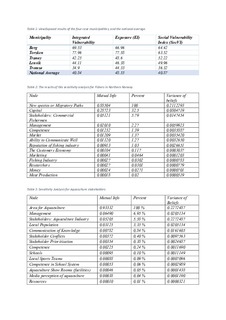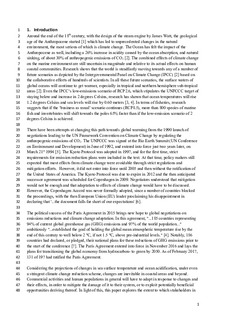| dc.contributor.author | Tiller, Rachel | |
| dc.contributor.author | Richards, Russell | |
| dc.date.accessioned | 2018-11-30T14:17:40Z | |
| dc.date.available | 2018-11-30T14:17:40Z | |
| dc.date.created | 2018-05-08T22:33:09Z | |
| dc.date.issued | 2018-09 | |
| dc.identifier.citation | Marine Policy | nb_NO |
| dc.identifier.issn | 0308-597X | |
| dc.identifier.uri | http://hdl.handle.net/11250/2575652 | |
| dc.description.abstract | Globally, the projected increase in sea surface temperature is expected to facilitate large changes in the marine food web, affect coastal communities, marine ecosystem goods and services, global fisheries, tourism, aquaculture and others. This ongoing change takes place on different time scales, and coincides with increasing global demand for seafood, a growing middle class, and expectations of future need for food security from the marine sector. This article contributes to advances in climate change research by exploring, within the context of the results of the viewExposed program for assessing Integrated Vulnerabilities in different municipalities in Norway, to what extent stakeholders in different industries are willing to accept, or expect to be able to adapt to, these new realities. This was investigated through stakeholder driven workshops with stakeholders from maritime industries, commercial fisheries, tourism and aquaculture in Norway using the conceptual modeling tools of systems thinking and Bayesian Belief Networks. Results showed that commercial fishers are worried about quota allocations with changes in fish distribution. The aquaculture industry was worried about allocations of new areas for industry expansion in contested areas in Northern Norway, and the tourism industry was worried about changes in communications (transport) in light of a changing climate. Only the commercial fishers perceived that their adaptive capacity was low in light of these changes, especially the small-scale coastal fishers. This was because they expected the combination between increased power of the aquaculture industry and new species requiring expensive quotas would be too critical. | nb_NO |
| dc.description.sponsorship | This work was supported partially by the European Commission (OCEAN-CERTAIN, FP7-ENV-2013-6.1-1; no: 603773) and the Norwegian Research Council project REGIMES 257628. | nb_NO |
| dc.language.iso | eng | nb_NO |
| dc.publisher | Elsevier | nb_NO |
| dc.rights | Attribution-NonCommercial-NoDerivatives 4.0 Internasjonal | * |
| dc.rights.uri | http://creativecommons.org/licenses/by-nc-nd/4.0/deed.no | * |
| dc.title | Ocean futures: Exploring stakeholders' perceptions of adaptive capacity to changing marine environments in Northern Norway | nb_NO |
| dc.title.alternative | Ocean futures: Exploring stakeholders' perceptions of adaptive capacity to changing marine environments in Northern Norway | nb_NO |
| dc.type | Journal article | nb_NO |
| dc.type | Peer reviewed | nb_NO |
| dc.description.version | acceptedVersion | nb_NO |
| dc.rights.holder | © 2018 Elsevier Ltd. - Accepted manuscript © the authors 2018 | nb_NO |
| dc.source.pagenumber | 227-238 | nb_NO |
| dc.source.volume | 95 | nb_NO |
| dc.source.journal | Marine Policy | nb_NO |
| dc.identifier.doi | 10.1016/j.marpol.2018.04.001 | |
| dc.identifier.cristin | 1584222 | |
| dc.relation.project | Norges forskningsråd: 257628 | nb_NO |
| dc.relation.project | EC/FP7/603773 | nb_NO |
| cristin.unitcode | 7566,2,0,0 | |
| cristin.unitname | Sjømatteknologi | |
| cristin.ispublished | true | |
| cristin.fulltext | postprint | |
| cristin.qualitycode | 1 | |


